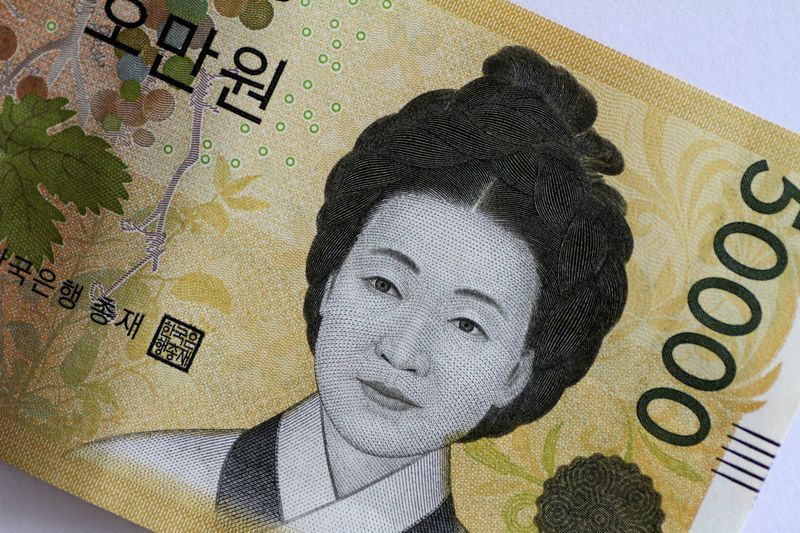By Jihoon Lee and Yena Park
SEOUL (Reuters) -The South Korean gained dropped to its weakest stage in 15 years on Thursday, weighed down by risk-averse sentiment after the U.S. Federal Reserve’s cautious stance on extra rate of interest cuts, in addition to home political uncertainty.
The gained was quoted at 1,448.9 per greenback in onshore commerce as of 0518 GMT, after opening the session at 1,453.0 per greenback, 0.96% decrease than the day gone by and the weakest since March 16, 2009.
The U.S. central financial institution minimize rates of interest on Wednesday, as anticipated, however Federal Reserve Chair Jerome Powell stated extra reductions in borrowing prices now hinged on additional progress in decreasing stubbornly excessive inflation.
U.S. central bankers now challenge they are going to make simply two quarter-percentage-point price reductions subsequent 12 months, half a share level lower than anticipated in September, with increased projections of inflation for the primary 12 months of the brand new Donald Trump administration.
The hawkish stance pushed up the greenback and added to downward strain on the gained, which had already been weighed down by home political turmoil after impeached President Yoon Suk Yeol’s short-lived martial regulation try earlier this month.
Considering the unfavourable financial impression of the Dec. 3 martial regulation order, the Financial institution of Korea flagged on Wednesday draw back dangers to its financial progress forecasts for this 12 months and subsequent 12 months.
Up to now in December, the gained has weakened 3.9% in opposition to the greenback, extending losses for a 3rd consecutive month.
The gained, down 11% year-to-date, is the worst performing rising Asian foreign money of the 12 months and is about to file its worst 12 months since 2008.
Previous to market open on Thursday, South Korea’s finance minister stated the federal government and the central financial institution would swiftly and boldly deploy measures to stabilise monetary markets if volatility was seen as extreme.
“It is suspected that authorities are defending the 1,450 figure, making it difficult to short the won around the level,” one native foreign money dealer stated.
To assist ease strain on the foreign money, the nation’s Monetary Providers Fee requested native banks to flexibly handle overseas trade transactions and loans.

The Financial institution of Korea expanded its overseas trade swap line with the Nationwide Pension Service, a market stabilising software absorbing greenback demand stemming from rising abroad funding by the world’s third-largest pension fund.
Within the inventory market, the benchmark dropped as a lot as 2.5%, as foreigners offered native shares.




